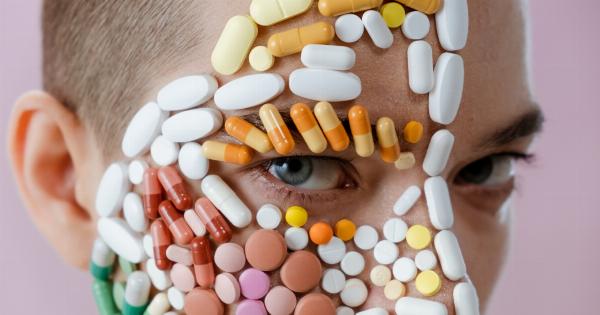Eye blushing, also known as eye redness or bloodshot eyes, is a common condition that many people experience at some point in their lives.
It can occur due to various reasons, such as allergies, eye infections, dryness, fatigue, or even excessive crying. While eye blushing is usually a temporary condition, understanding its causes and knowing what to do can help alleviate discomfort and prevent further complications.
Causes of Eye Blushing
1. Allergies:.
Allergic reactions can cause redness and itching in the eyes. Common allergens include pollen, dust mites, pet dander, and certain foods. If you are prone to allergies, avoiding triggers and using antihistamine eye drops can help reduce eye blushing.
2. Eye Infections:.
Infections such as conjunctivitis (pink eye) can lead to eye blushing. Pink eye is highly contagious and is commonly caused by bacteria or viruses. It requires prompt medical attention and may be treated with antibiotic eye drops or ointments.
3. Dryness:.
Dry eye syndrome occurs when the eyes do not produce enough tears or the tears evaporate too quickly. This can result in eye blushing, along with symptoms such as itching, burning, and a gritty sensation.
Using artificial tear drops and avoiding dry environments can help alleviate dryness-related eye blushing.
4. Fatigue and Lack of Sleep:.
When you are overtired or haven’t had enough sleep, your eyes may become bloodshot and appear red. Lack of sleep can cause the blood vessels in the eyes to dilate, resulting in eye blushing.
Getting an adequate amount of rest and practicing good sleep hygiene can help prevent this.
5. Irritants:.
Exposure to irritants such as smoke, chemicals, or allergens can cause eye blushing. It is essential to protect your eyes from irritants by wearing safety goggles or avoiding environments with known irritants.
6. Foreign Objects:.
Foreign objects, such as dust particles or eyelashes, can often irritate the eyes and lead to eye blushing. If you feel a foreign object in your eye, avoid rubbing it and instead flush it out gently with clean water or use an eye wash solution.
7. Contact Lens Wear:.
Wearing contact lenses for an extended period or not following proper hygiene practices can lead to eye blushing and discomfort.
Ensure proper contact lens hygiene, such as cleaning and replacing them as recommended, to prevent eye blushing caused by contact lens wear.
What To Do When You Experience Eye Blushing
1. Use Artificial Tears:.
If your eye blushing is caused by dryness, using artificial tears can help provide relief. These lubricating eye drops can soothe the eyes and reduce redness. It is essential to choose preservative-free eye drops and follow the instructions provided.
2. Apply a Warm Compress:.
If your eye blushing is due to fatigue or irritation, applying a warm compress can help soothe the eyes. The warmth can stimulate blood circulation and relax the eye muscles, which may alleviate the redness.
3. Avoid Rubbing Your Eyes:.
Although rubbing your eyes may provide temporary relief, it can worsen eye blushing and potentially introduce more irritants. Instead of rubbing, try gently rinsing your eyes with cool, clean water or using over-the-counter saline solution.
4. Maintain Good Eye Hygiene:.
Keeping your eyes clean and maintaining good eye hygiene can prevent eye infections and reduce the risk of eye blushing. Wash your hands regularly, avoid touching your eyes unnecessarily, and follow proper contact lens care guidelines.
5. Seek Medical Advice:.
If your eye blushing persists, is accompanied by severe pain, discharge, or vision changes, it is essential to seek medical advice.
A healthcare professional can examine your eyes, determine the underlying cause, and prescribe appropriate treatment if necessary.
6. Try Over-the-Counter Allergy Medication:.
If your eye blushing is caused by allergies, over-the-counter antihistamine eye drops or oral allergy medication can provide relief. However, it is advisable to consult a healthcare professional or pharmacist before starting any new medication.
Prevention Tips for Eye Blushing
1. Protect Your Eyes:.
Wearing protective eyewear, such as safety goggles, can prevent eye blushing caused by irritants, chemicals, or foreign objects.
Additionally, wearing sunglasses with UV protection can shield your eyes from harmful sun rays and reduce the risk of eye blushing due to excessive sun exposure.
2. Practice Good Eye Care Habits:.
Follow proper eye care habits, including regular eye exams, proper contact lens hygiene, and adherence to prescribed treatments for eye conditions. Routine eye exams can help detect any underlying issues early and address them promptly.
3. Manage Allergies:.
If you suffer from allergies, identify your triggers and take necessary precautions to minimize exposure.
This may involve keeping windows closed during high pollen seasons, using air purifiers, and regularly cleaning your living spaces to reduce allergens.
4. Take Breaks During Digital Device Use:.
Extended periods of staring at screens can lead to eye strain and contribute to eye blushing. Follow the 20-20-20 rule, which suggests taking a 20-second break every 20 minutes and looking at something 20 feet away to reduce eye strain.
5. Stay Hydrated:.
Drinking an adequate amount of water can help prevent eye blushing caused by dryness. Proper hydration supports tear production and maintains the lubrication necessary for comfortable and healthy eyes.
Eye blushing is a common and typically harmless condition, but it can cause discomfort and affect your appearance.
By understanding the causes and implementing preventive measures, you can maintain good eye health and minimize the occurrence of eye blushing.






























